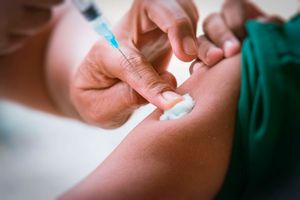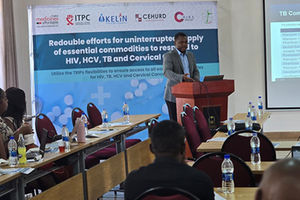Two million people to benefit from injectable HIV drug

Lenacapavir has demonstrated enormous potential as a new HIV prevention tool with a 100 per cent efficacy rate and zero infections.
What you need to know:
- Currently, lenacapavir is approved in the US and other countries for the treatment of adults with drug-resistant HIV. But in two clinical trials, it has shown near-complete ability to block HIV when used as PrEP.
An estimated two million people in countries supported by the US President's Emergency Plan for AIDS Relief (PEPFAR) and the Global Fund, including Kenya, are expected to gain access to lenacapavir, a twice-yearly antiretroviral injection that prevents HIV infection, over the next three years.
Access to lenacapavir is subject to approval by the US Food and Drug Administration (FDA), national drug regulatory authorities, and a recommendation by the World Health Organization (WHO).
In September 2015, WHO recommended that people at high risk of HIV infection should be offered tenofovir disoproxil fumarate -based oral pre-exposure prophylaxis (PrEP) as an additional prevention option as part of comprehensive prevention.
In 2021, WHO recommended that the dapivirine ring may be offered as an additional prevention choice for women at substantial risk of HIV.
In 2022, it recommended that long-acting injectable cabotegravir (CAB-LA) may be offered as an additional prevention choice for people at substantial risk of HIV.
CAB-LA is a long-acting intramuscular injectable form of PrEP, with the first two injections given four weeks apart, followed by one injection every eight weeks.
Currently, lenacapavir is approved in the US and other countries for the treatment of adults with drug-resistant HIV. But in two clinical trials, it has shown near-complete ability to block HIV when used as PrEP.
In the PURPOSE 1 trial, none of the 2,138 women who received lenacapavir became infected with HIV. In PURPOSE 2, which included men and gender-diverse people, only two of the 2,179 participants became infected, a success rate of over 99 per cent.
Both trials tested lenacapavir alongside oral PrEP and found it to be superior because the twice-yearly injection is much easier to adhere to than taking daily pills.
"We cannot achieve a sustainable response to HIV without rapidly reducing the 1.3 million new HIV infections that occur each year worldwide. Lenacapavir offers a potentially enormous opportunity to transform the impact of HIV programmes to ensure that adolescent girls and young women, key populations and others who could benefit, have access to highly effective HIV prevention, testing and treatment services, and to end HIV/Aids as a public health threat by 2030," said Dr John Nkengasong, US Global AIDS coordinator and head of PEPFAR.
In October, the drug's manufacturer, Gilead, announced that it had signed non-exclusive, voluntary licensing agreements with six pharmaceutical companies to manufacture and supply generic versions of lenacapavir to 120 primarily low- and lower-middle-income countries.
"Data from both PURPOSE 1 and PURPOSE 2 will support a series of global regulatory submissions for lenacapavir that will begin by the end of 2024," Gilead said.
The FDA has granted lenacapavir for PrEP breakthrough therapy designation, which is intended to expedite the development and review of new drugs that may offer a substantial improvement over existing therapies.
This group will develop and issue guidelines based on a rigorous assessment of lenacapavir's potential for HIV prevention, including key aspects such as efficacy, safety, cost-effectiveness, stakeholder and community values and preferences, and global scalability.
"At the Global Fund, we are incredibly excited about the promise of lenacapavir and its potential to help us achieve further significant reductions in new infections among people at high risk of HIV. As part of this coordinated effort, the Global Fund, PEPFAR, CIFF and BMGF will work with Gilead and the voluntary licensing manufacturers to accelerate affordable and equitable access so that more people can benefit from this powerful innovation from day one," said Peter Sands, executive director of the Global Fund.
Chris Hohn, founder and chair of CIFF, emphasised the importance of making lenacapavir available.
"It would be a travesty if the communities that need it most don't have access. That is why this collaboration is so important to ensure that lenacapavir is available as soon as possible to those who need it most," said Mr Hohn.





